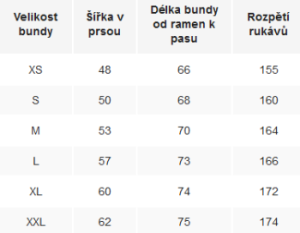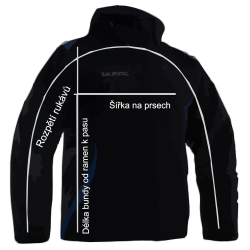Counseling
----------------------------------------------------------------
How to choose floorball sticks
- height 110 cm, stick length 50-55cm
- height 115 cm, stick length 50-55cm
- height 120 cm, stick length 60-67cm
- height 125 cm, stick length 60-67cm
- height 130 cm, stick length 70-77cm
- height 135 cm, stick length 70-80cm
- height 140 cm, stick length 80-82cm
- height 145 cm, stick length 80-82cm
- height 150 cm stick length 85-87cm
- height 155 cm, stick length 85-90cm
- height 160 cm, stick length 90-92cm
- height 165 cm, stick length 90-92cm
- height 170 cm, stick length 91-95cm
- height 175 cm, stick length 95-96cm
- height 180 cm, stick length 95-98cm
- height 185 cm, stick length 95-103cm
- height 190 cm stick length 100-103cm
- height >190 cm stick length 103-105cm
The length of a floorball stick should reach the navel. The correct length of a floorball stick is important for ball control and accurate shooting.
Long hockey stick:
- slow work with the ball
- bad shooting
- ball away from the body
Short stick:
- short range
- risk of back injury
How to choose the right floorball stick grip?
Holding a floorball stick is determined by the hand that is lower when holding the stick.
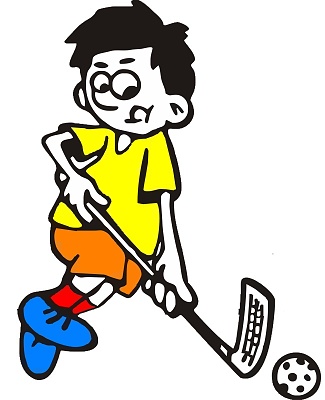
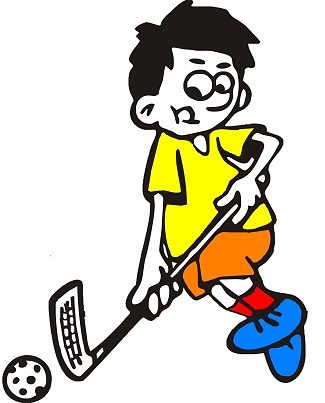
LEFT - left hand is down on the stick RIGHT - right hand is down on the stick
How to choose the right hockey stick hardness?
The right hardness should help you get the best out of your floorball stick. For example, if you choose a shaft that is too hard, the stick will not bend as much when you shoot and the shot will be slower. The greater your strength, the harder the floorball stick should be. On the contrary, if you choose a shaft that is too soft, you will bend it too much and then the blade will twist and the shots will not have the right direction.
The hardness of floorball sticks is indicated by numbers from 23 to 40. This number indicates the number of millimeters by which the stick bends when a force of 300 N is applied, i.e. a load of 30 kg. The higher the number indicating the hardness, the softer the stick and the stick bends more when shooting, and conversely, the lower the number, the harder the stick and does not bend as much when shooting or passing.
Recommended stick hardnesses:
- player weight 0 - 50 kg, stick hardness 32 - 40 mm - soft sticks
- player weight 50 - 60 kg, stick hardness 30 - 32 mm - soft sticks
- player weight 60 - 75 kg, stick hardness 27 - 30 mm - medium-hard sticks
- player weight 75 - 90 kg, stick hardness 25 - 27 mm - hard sticks
- player weight over 90 kg, stick hardness 23 - 25 mm - hard sticks
Stick material
When choosing a stick, the material from which the stick is made plays a role, which mainly determines the total weight of the stick. The durability of the sticks is always the same, whether it is a basic composite material or a more expensive carbon material. With more expensive materials, you pay extra for lower weight, which brings a better feeling of control over the ball.
Composite
Composite material is the basic material for floorball sticks. It is characterized by its durability and strength.
Carbon
The majority of floorball sticks are made of carbon. Even if the description says carbon or graphite, it is always a mixture of composite and carbon. For the most expensive and lightest sticks, this ratio is 85% carbon and 15% composite. Carbon is characterized by low weight while maintaining high strength. At the same time, carbon has an excellent flexural curve, which means that a carbon product ages slowly due to stress. Carbon absorbs shocks and vibrations very well, which you will feel when hitting shots, when a minimum of energy is returned to you.
-----------------------------------------------------------------
Correct blade hardness
We divide blades into three basic categories according to the hardness of the material from which the blades are made:
Soft blade - excellent control and ball handling, suitable for more technical players, ideal for pull shots, trouble-free reception of the pass. A choice for players who like to play with the ball and at the same time for shooting from a closer distance. When shooting with a tap, the tip of the blade can "twist" and the shot is then not accurate. The marking on the blade is SB.
Medium-hard blade - the most commonly used type of blade, which maintains excellent control over the ball, but also allows for powerful shooting. Universal hardness for most players. Ideal for a combination of technical style and wrist or pull shots. For occasional golf shooting. The marking on the blade is MB.
Hard blade - a blade made of hard material will allow for harder hitting shots, will not twist and will hold its manufacturing shape longer. Hard material requires skill when receiving passes because the ball tends to bounce. ideal for hard hitting shots from longer distances. The marking on the blade is HB.
Hardness markings for some brands:
softer blade - normal - designation: NB/SB
- products from the Exel and Canadien brands are marked SB
- Salming products are marked as "Touch"
Suitable for technical players
softer blade - normal - NBC marking
- blade with carbon element
medium hard blade - MB (medium blade)
- hardness is universal and will be appreciated by the largest group of players
- Salming products are marked "Endurance"
medium blade - MBC (medium blade)
- blade with carbon element
hard blade - HB (hard blade)
- suitable blade type for power players
- hardness is not common and most manufacturers do not produce it
- Salming products are marked "Biopower"
-----------------------------------------------------------------
How to choose goalkeeper equipment
All measurements are in centimeters (cm) and are the average between two adjacent sizes. If your measurements are between these two sizes, choosing a smaller size will make the garment fit more snugly, and choosing a larger size will make it fit more loosely.
Height and chest measurements are used for jerseys and all other upper garments, while waist and hip measurements are used for shorts and all lower garments.
If the height and chest measurements are between two sizes, it is recommended to use the chest measurement to determine the size.
If the waist and hip measurements are between these two sizes, it is recommended to use the hip measurement to determine the size.
In case of atypical body dimensions, we recommend consulting us in advance.
The sizes of individual manufacturers may be different.
HOW TO MEASURE YOUR FIGURE:
Chest circumference at its widest point, horizontally under the armpit.
Waist circumference at the narrowest point above the hips.
Hip circumference at the widest point across the hips.
Height measured from the top of the head to the heel of the foot
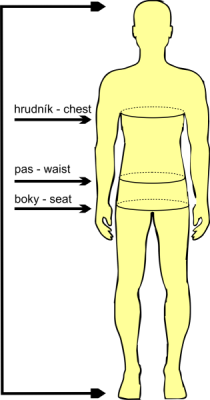
Goalkeeper jersey size charts :
Blindsave brand:
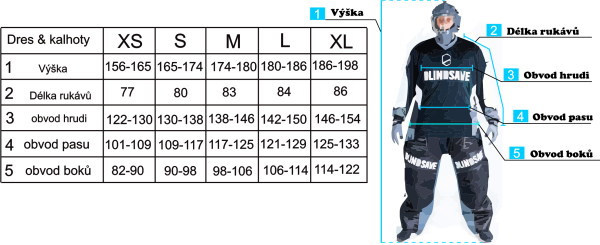
Brand: Jadberg
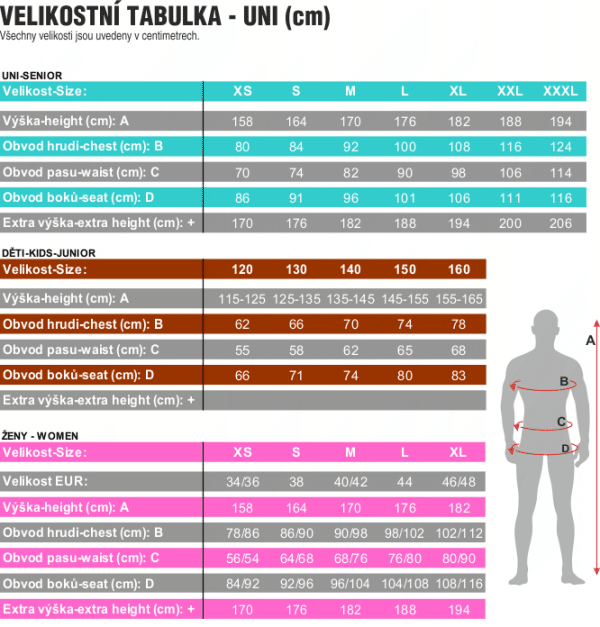
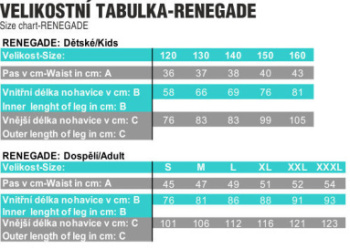
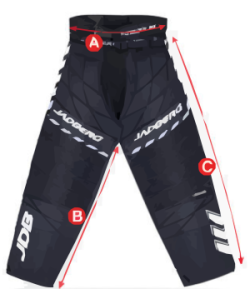
Brand: Salming
Salming jersey
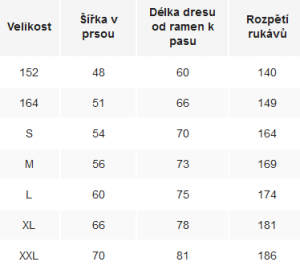
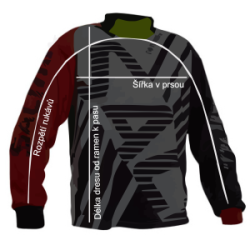
Salming pants
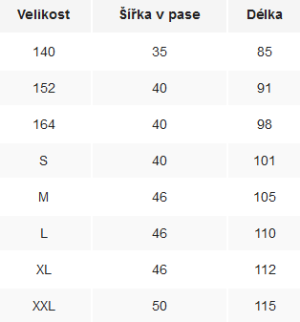
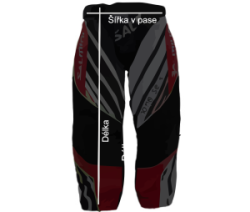
Salming Core vest
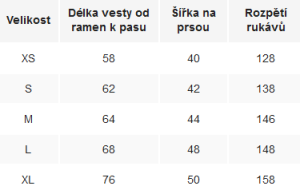
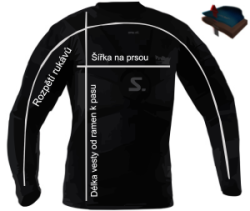
Salming Protech vest
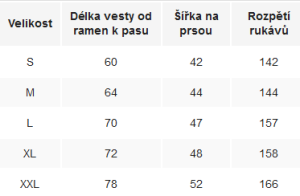
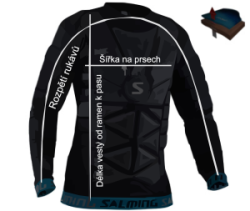
PROTECH knee protectors

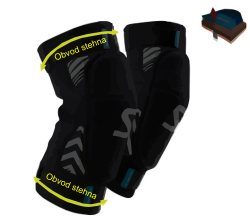
CORE knee pads
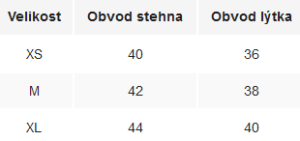
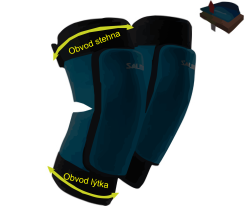
Goalkeeper shoes Slide
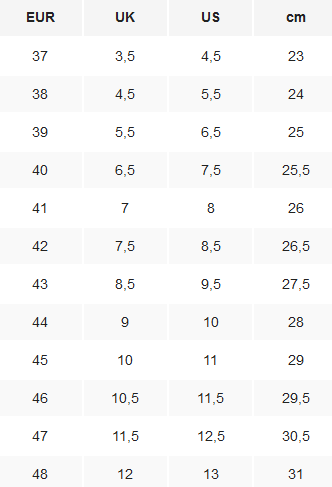
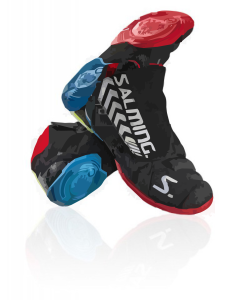
Freez glove size chart
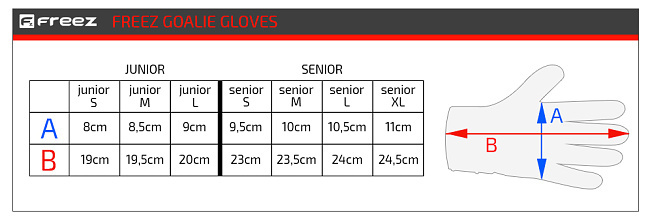
-----------------------------------------------------------------
How to choose the right shoes
-----------------------------------------------------------------
Running shoes
Running shoes are the most important piece of equipment you need for running. That's why it's worth taking the time and care to choose them so that you get exactly the shoe that fits you perfectly and helps you perform better and maintain optimal musculoskeletal health. So how do you choose the right running shoes?
According to use
If you are a beginner, overweight or have training to do, it is a good idea to choose cushioned shoes that soften the impact and absorb vibrations, thus protecting your joints and muscles from excessive strain. For races and tempo training, lighter shoes are ideal, designed for speed and good contact with the surface.
By surface
If you run mostly on asphalt and possibly on paved forest or field roads, road shoes will be ideal for you. Off-road running shoes are for when you head out among rocks, gravel, mud, snow and similarly difficult terrain.
According to the tread
The way you walk is very important when choosing shoes. There are three main types: pronation, pronation, and neutral. You can also find running shoes that are designed with the shape of the soles of these three types.
By size
For running shoes, you need to add an extra centimeter to the length of your foot to avoid rubbing your feet while running.
Men's running shoes
Size chart for Unihoc men's running shoes:
| UK | US | EUR | CM |
| 3.5 | 4.5 | 36 | 24.6 |
| 4 | 5 | 37 | 25 |
| 5 | 6 | 38 | 25.8 |
| 5.5 | 6.5 | 39 | 26.3 |
| 6.5 | 7.5 | 40 | 27.2 |
| 7 | 8 | 41 | 27.5 |
| 8 | 9 | 42 | 28.4 |
| 9 | 10 | 43 | 29.2 |
| 9.5 | 10.5 | 44 | 29.7 |
| 10 | 11 | 45 | 30.1 |
| 11 | 12 | 46 | 30.9 |
| 12 | 13 | 47 | 31.8 |
Size chart for Salming men's running shoes:
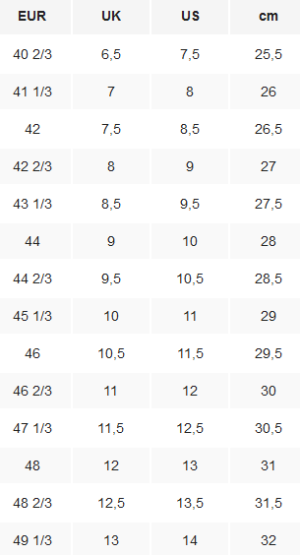

Women's running shoes
Size chart for Salming women's running shoes:
Collection 2017
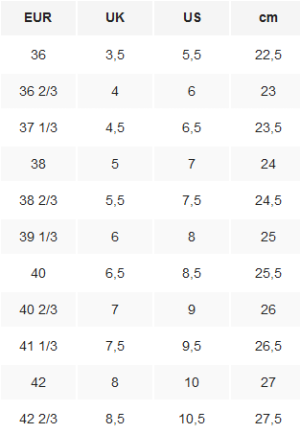

Collection 2016 and older
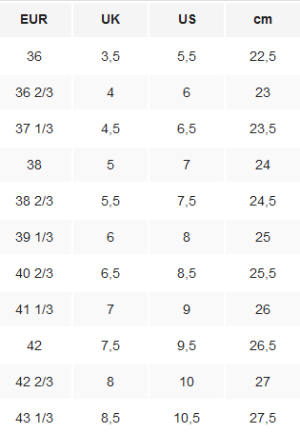
-----------------------------------------------------------------
Indoor shoes
Indoor shoes are the most important accessory for indoor sports. A bad choice will spoil the joy of the game. The basic requirements are the same for every indoor sport. Indoor shoes have specific properties, including a non-staining rubber sole. Indoor shoes or indoor shoes are suitable for all sports in gyms, halls and other indoor surfaces.
Men's indoor shoes
Size chart for Adidas men's indoor shoes:
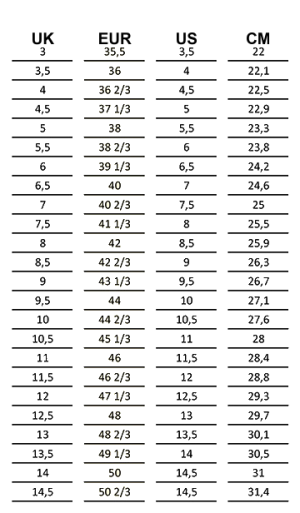

Size chart for men's indoor shoes from Puma:
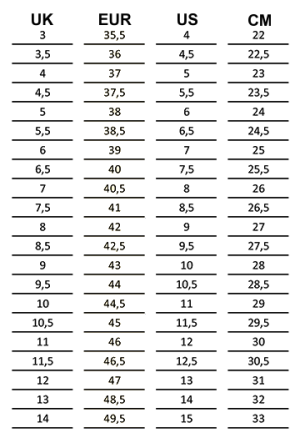
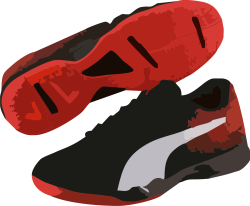
Size chart for Salming men's indoor shoes :
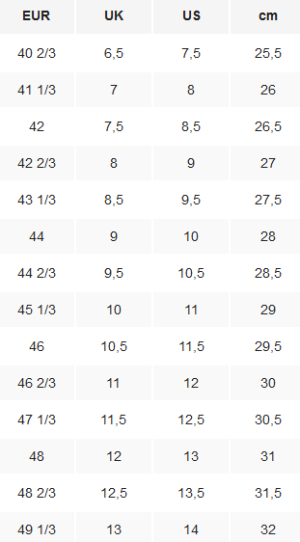

Size chart for Unihoc men's indoor shoes :
| UK | US | EUR | CM |
| 3.5 | 4.5 | 36 | 24.6 |
| 4 | 5 | 37 | 25 |
| 5 | 6 | 38 | 25.8 |
| 5.5 | 6.5 | 39 | 26.3 |
| 6.5 | 7.5 | 40 | 27.2 |
| 7 | 8 | 41 | 27.5 |
| 8 | 9 | 42 | 28.4 |
| 9 | 10 | 43 | 29.2 |
| 9.5 | 10.5 | 44 | 29.7 |
| 10 | 11 | 45 | 30.1 |
| 11 | 12 | 46 | 30.9 |
| 12 | 13 | 47 | 31.8 |
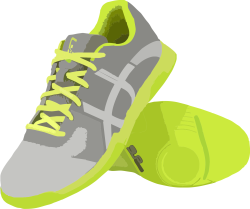
Women's indoor shoes
Size chart for Adidas women's indoor shoes:
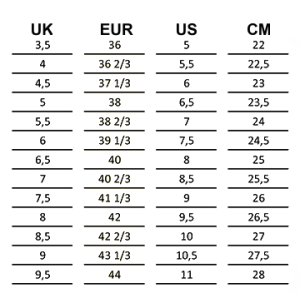

Size chart for Salming women's indoor shoes :
Collection 2016/2017 and newer
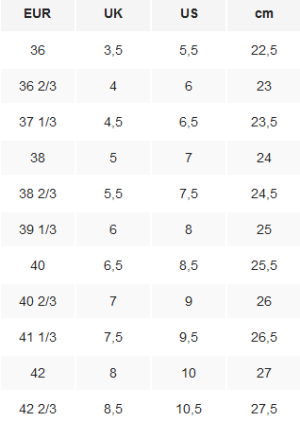

Collection 2016 and older
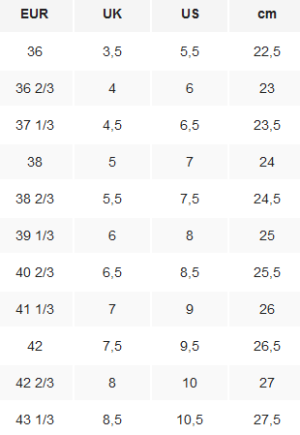
Size chart for women's indoor shoes from Unihoc:
| UK | US | EUR | CM |
| 3.5 | 4.5 | 36 | 24.6 |
| 4 | 5 | 37 | 25 |
| 5 | 6 | 38 | 25.5 |
| 5 1/4 | 6 1/4 | 38.5 | - |
| 5.5 | 6.5 | 39 | 26 |
| 6 | 7 | 39.5 | 26.5 |
| 6.5 | 7.5 | 40 | 27 |
| 6 3/4 | 7 3/4 | 40.5 | - |
| 7 | 8 | 41 | 27.5 |
| 7.5 | 8.5 | 41.5 | 28 |
| 8 | 9 | 42 | 28.4 |

Children's indoor games
Size chart for children's indoor shoes from Adidas:
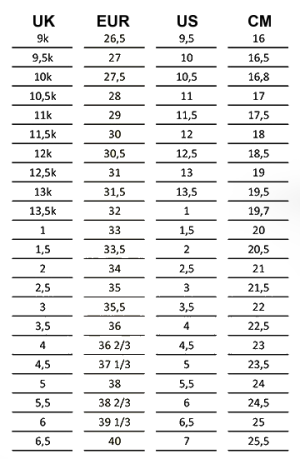

Size chart for Puma children's indoor shoes:
Shoes for little children shoes for children
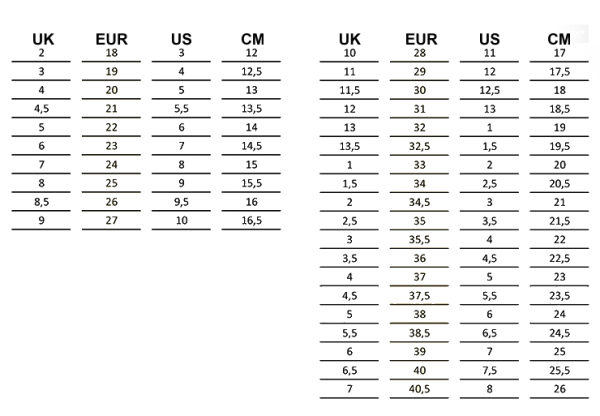
Size chart for junior indoor shoes from Salming:
Collection 2016/2017 and newer
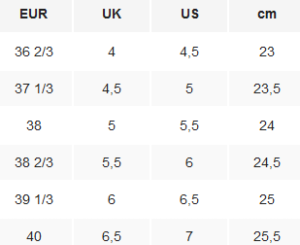

Collection 2015/2016 and older
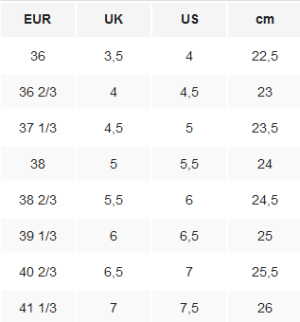
Size chart for children's indoor shoes from Salming:
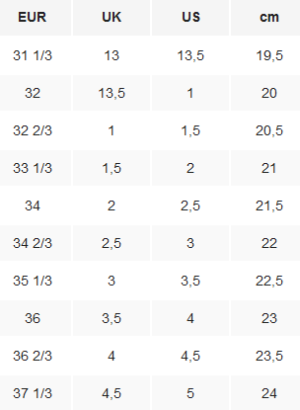
Size chart for Unihoc children's indoor shoes:
| UK | US | EUR | CM |
| kid 13 | 1 | 32 | 21 |
| 1 | 2 | 33 | 21.5 |
| 2 | 3 | 34 | 22.5 |
| 2.5 | 3.5 | 35 | 23 |
| 3.5 | 4.5 | 36 | 23.5 |
| 4 | 5 | 37 | 24 |

-----------------------------------------------------------------
Sportswear size charts
Salming sportswear:
Jerseys:
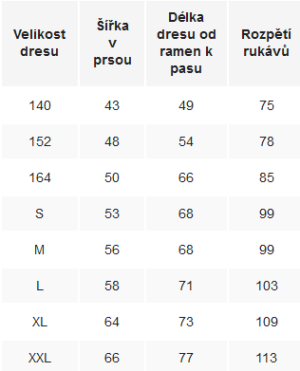
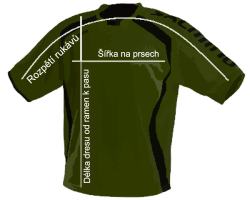
CORE Shorts:
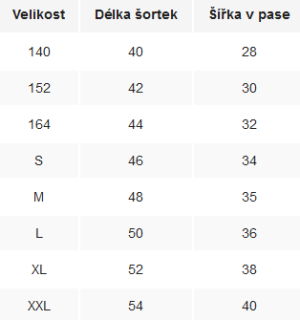
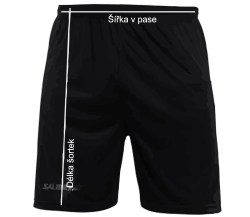
MAPLE shorts:
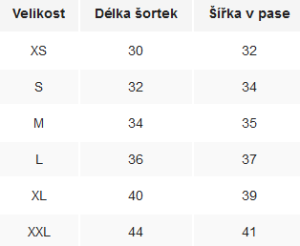
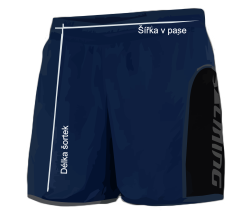
Distinctive sets:
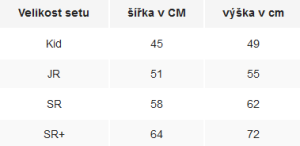
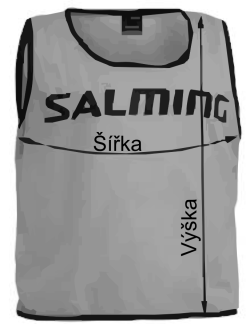
Men's sweatshirts:
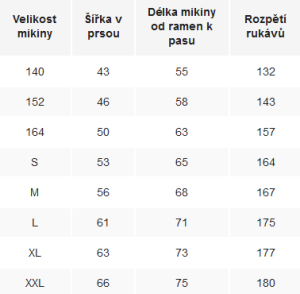
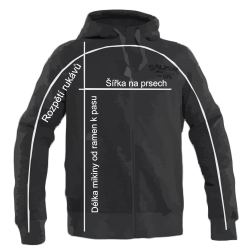
Women's sweatshirts:
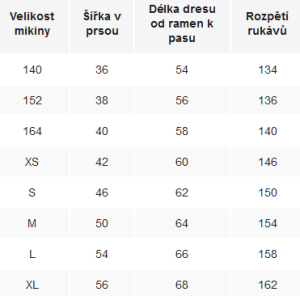
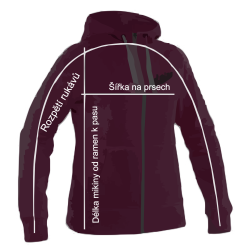
Men's sweatpants:
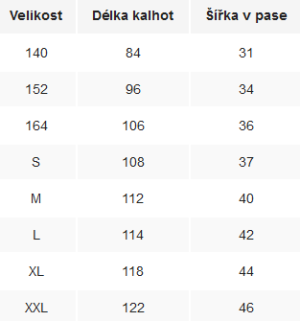
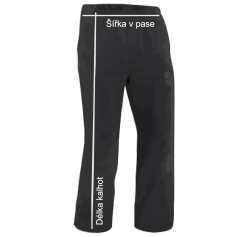
Women's sweatpants:
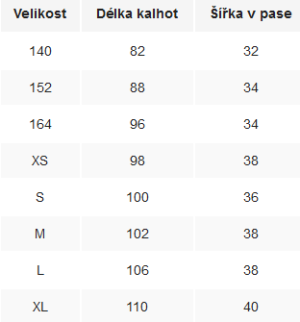
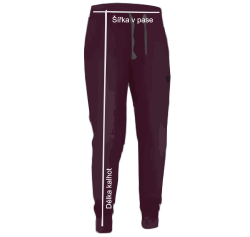
T-shirts:
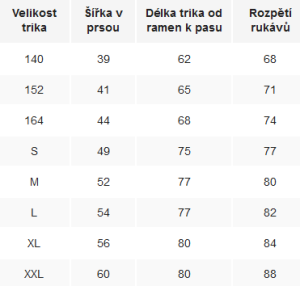
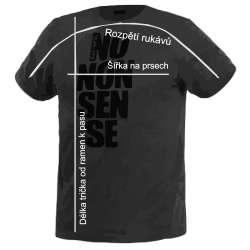
Jackets:
